In recent weeks we’ve had unnerving encounters with black mambas, spitting cobras and puff adders. Winter is on its way and as our house has no walls, the snakes sometimes come in to burrow under chairs to keep warm, or hide in dark places to catch unsuspecting prey. When Sandra Libetwa, who sometimes helps out at our house, lifted a chair under which lay a huge spitting cobra and screamed all hell, I was reminded of this piece I wrote a few years ago (she was fine, by the way). It was a record-breaking blogpost with thousands of views, making me ask myself what is it about snakes that so fascinates us humans?
The day a 14-foot python, out hunting for food, strangled our Staffordshire bull terrier to death in front of my mother and me during an evening walk on the farm in Zimbabwe, was the day my scales tipped from wary ambivalence to fear and loathing of snakes. Up close the python’s coils around the dog were as thick as a strong man’s leg; its stench was so rancid it made me dry-heave. Pythons kill their prey and swallow them whole, which is why they smell of rotten meat. The dog died trying to bite into the snake’s neck, but it never stood a chance. It was dead in less than a minute.
Living as we do, with no doors and articulated walls that stay open most of the year because of the heat, snakes can slither in and out of our house at will. In the two-and-a-half years I’ve lived here I’ve seen maybe three or four snakes inside. They usually venture into the house to find a safe, dark, spot in which to stay warm during our short winter, like under a sofa or bed.
Once, when a visiting professor and his wife from California came for lunch, our attention was called to the u-shaped mid-riff of a snake, its head and tail buried inside a crack in our front step. While we were all peering over the snake to see if it was stuck, the hooded head of a Mozambique spitting cobra, weighed heavy with the body of a frog in its mouth, slowly emerged from the crack. The poor frog’s legs were splayed cartoon-like out of its mouth, which was lucky for us: the snake could neither spit nor bite.
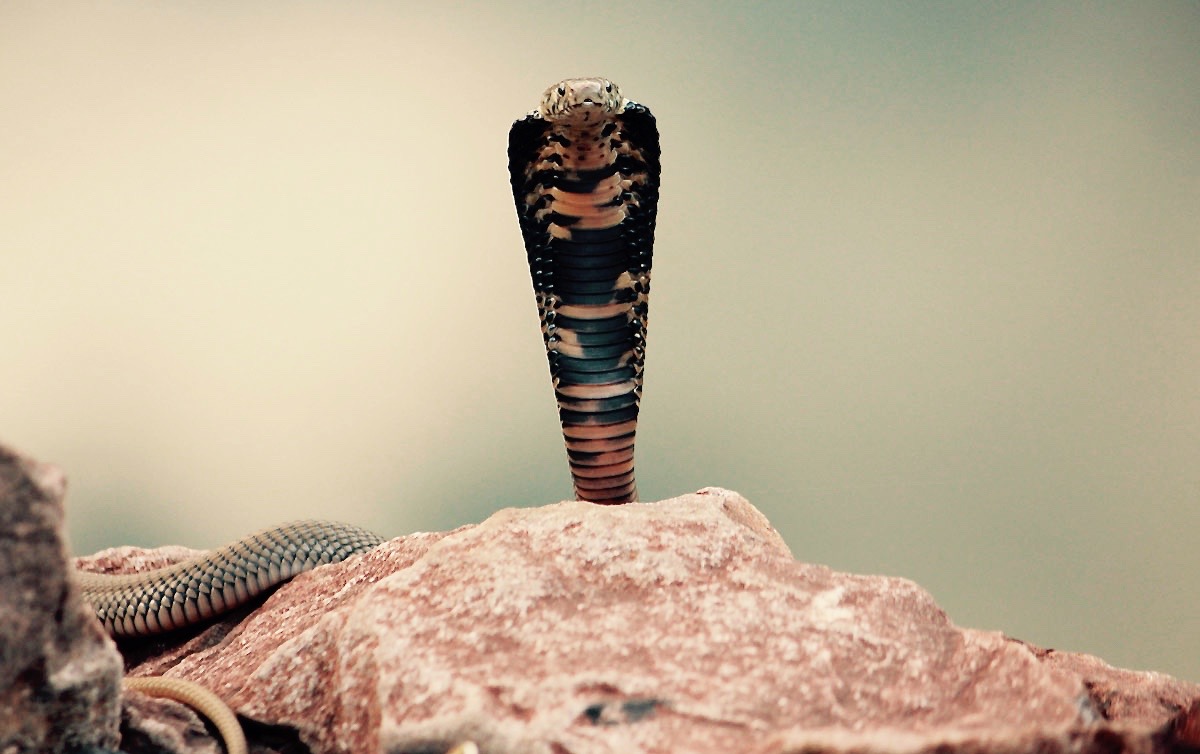
The Mozambique spitting cobra is our most common snake. Other than having once watched boomslangs mating — a three-day spectacle of coiling and roiling through the grass, up and down trees, oblivious to anything other than their task at hand — I have never seen another species of snake. I know they are out there, and we heard only last Sunday that the continent’s deadliest snake, the one every African really fears, the black mamba, is not uncommon in the bush along the Zambezi river. But we live up on the escarpment where the ecology is different. Thank the Lord.
All the same, the Mozambique spitting cobra is not a snake for sissies, and is also considered one of the most dangerous in Africa. From what I’ve read the snake is nervous and highly-strung, “and when confronted at close quarters can rear up to as much as two-thirds of its length, spread its long narrow hood, and ‘spit’ in self-defense.” Its venom can be projected to a distance of two-to-three meters with remarkable accuracy, and if it’s in a position where it can’t spit then it will bite instead. Either way the venom isn’t deadly, but should be avoided at all costs.
Just ask our Jack Russell, Jackie, who came to bed one night with seeping eyes, swollen to slits, that were clearly agonizing. I bathed them in warm water until they could open again, and it was then I had a passing suspicion she might have been spat at by a cobra. The next morning Jackie appeared back to normal, and I never gave it another thought.
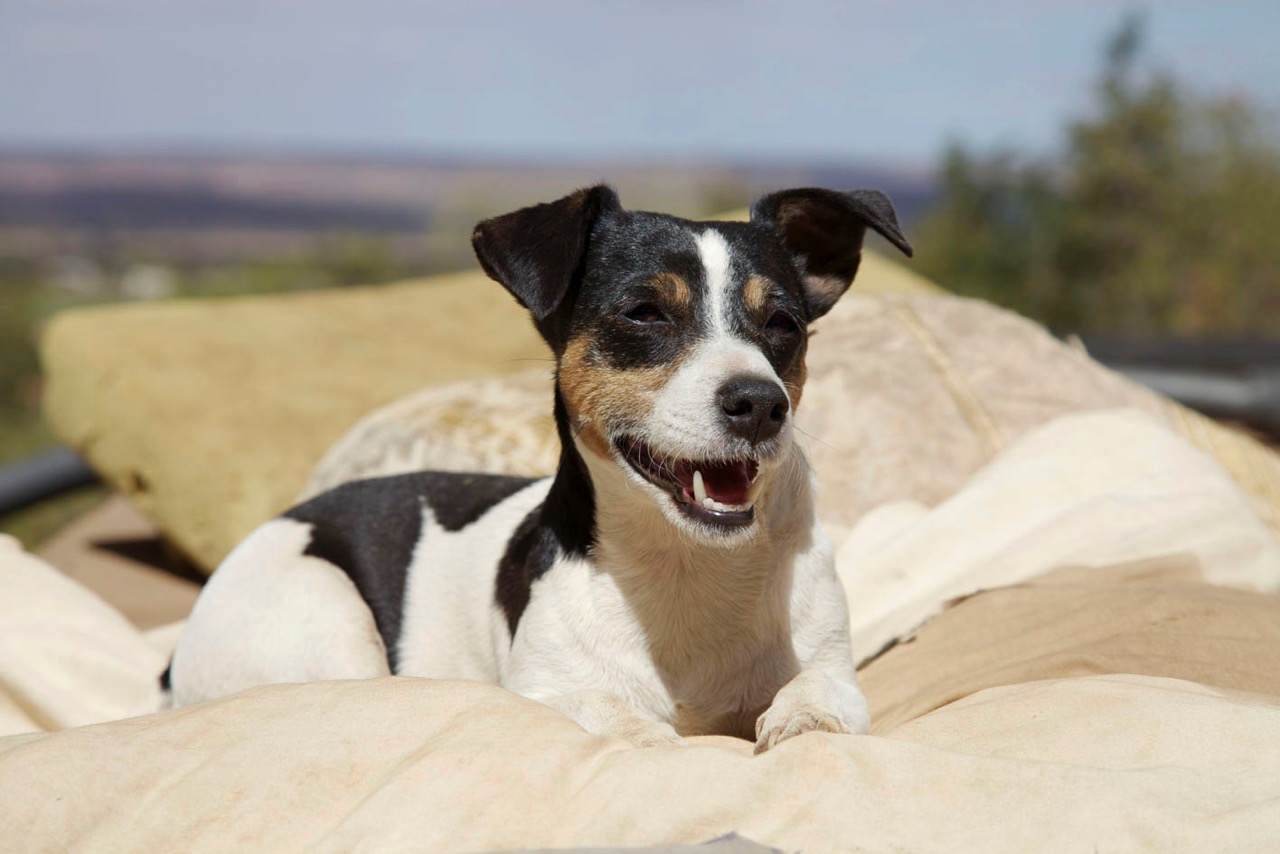
Until that was, during the late afternoon on the same day, I noticed each time I walked through the doorway of our bathroom my hair got wet. It felt as if a beetle was peeing on my head: little squirts once or twice, and then nothing more. I was busy preparing for a live television interview after I’d been asked by an American media organization to participate in a discussion on “land reform in Africa.” (My old life as a pro-democracy activist in Washington, D.C. suddenly surprised me by showing up in my new life here in Livingstone. You can click here for an excerpt, if you’re interested.)
Just minutes before starting the interview (over the telephone) I went to the loo and was squirted at again. This time I turned around and looked up. There above me, entangled in loose electrical wires atop the doorway, was a spitting cobra, reared up, narrow hood spread, giving me all it had left in its venom sacs. Probably for the first time in its life the snake missed, with both Chris and I concluding that over the course of the afternoon it had spat at me enough times to run out of venom. Either that, or it was so tangled up in the wires, the snake was unable to throw itself back enough to really give me a good gobbing.
I shouted for Chris who, at his lofty 6’6″, was the first to notice how the snake was tangled up in the wires. In the excitement of the moment, he slammed the snake’s dangling lower half in the steel frame of an articulated wall so hard it shattered our one and only bedroom window. The massive pane cracked slowly and crashed to the floor in a roaring crescendo of broken glass.
Going on live TV was stressful enough. Imagine being spat at by a cobra, followed by the loud report of slamming steel, followed by a crashing window pane, followed by going on live TV. It wasn’t just the glass that shattered. My nerves did too. I made it through the interview more-or-less unscathed, but the cobra didn’t. Like in D.H. Lawrence’s poem, Snake, it was despatched by Chris, yet not without the same regret about which the poet writes below.
Snake
by D.H. Lawrence
A snake came to my water-trough
On a hot, hot day, and I in pajamas for the heat,
To drink there.
In the deep, strange-scented shade of the great dark carob tree
I came down the steps with my pitcher
And must wait, must stand and wait, for there he was at the trough before me.
He reached down from a fissure in the earth-wall in the gloom
And trailed his yellow-brown slackness soft-bellied down, over the edge of the stone trough
And rested his throat upon the stone bottom,
And where the water had dripped from the tap, in a small clearness,
He sipped with his straight mouth,
Softly drank through his straight gums, into his slack long body,
Silently.
Someone was before me at my water-trough,
And I, like a second-comer, waiting.
He lifted his head from his drinking, as cattle do,
And looked at me vaguely, as drinking cattle do,
And flickered his two-forked tongue from his lips, and mused a moment,
And stooped and drank a little more,
Being earth-brown, earth-golden from the burning bowels of the earth
On the day of Sicilian July, with Etna smoking.
The voice of my education said to me
He must be killed,
For in Sicily the black, black snakes are innocent, the gold are venomous.
And voices in me said, if you were a man
You would take a stick and break him now, and finish him off.
But must I confess how I liked him,
How glad I was he had come like a guest in quiet, to drink at my water-trough
And depart peaceful, pacified, and thankless,
Into the burning bowels of this earth?
Was it cowardice, that I dared not kill him?
Was it perversity, that I longed to talk to him?
Was it humility, to feel so honored?
I felt so honored.
And yet those voices :
If you were not afraid, you would kill him!
And truly I was afraid, I was most afraid,
But even so, honored still more
That he should seek my hospitality
From out the dark door of the secret earth.
He drank enough
And lifted his head, dreamily, as one who has drunken,
And flickered his tongue like a forked night on the air, so black,
Seeming to lick his lips,
And looked around like a god, unseeing, into the air,
And slowly turned his head,
And slowly, very slowly, as if thrice a-dream,
Proceeded to draw his slow length curving round
And climb again the broken bank of my wall-face.
And as he put his head into that dreadful hole,
And as he slowly drew up, snake-easing his shoulders, and entered farther,
A sort of horror, a sort of protest against his withdrawing into that horrid black hole,
Deliberately going into the blackness, and slowly drawing himself after,
Overcame me now his back was turned.
I looked round, I put down my pitcher,
I picked up a clumsy log
And threw it at the water-trough with a clatter.
I think it did not hit him,
But suddenly that part of him that was left behind convulsed in undignified haste,
Writhed like lightning, and was gone
Into the black hole, the earth-lipped fissure in the wall-front,
At which, in the intense still noon, I stared with fascination.
And immediately I regretted it.
I thought how paltry, how vulgar, what a mean act!
I despised myself and the voices of my accursed human education.
And I thought of the albatross,
And I wished he would come back, my snake.
For he seemed to me again like a king,
Like a king in exile, uncrowned in the underworld,
Now due to be crowned again.
And so, I missed my chance with one of the lords
Of life.
And I have something to expiate:
A pettiness.

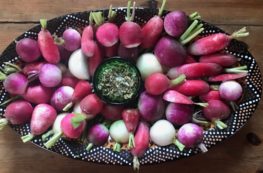
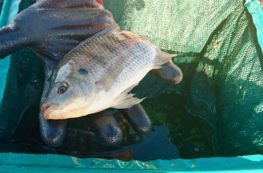
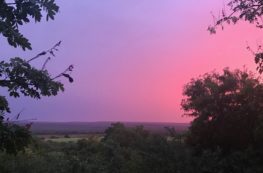
6 Comments
Thank you for reminding me, not of snakes, but of the artistry of words.
Dear Di … thank you so much for your super-kind comment. I so appreciate your continued interest in my writing and in my work. x
I missed this blog the first time round. So glad to have been able to enjoy it now. Your writing is wonderful, Annabel.
Thanks so much, dear Phee! I really appreciate your interest in my blog and taking the time to comment. xo
Never in a million years could I live in a house where snakes slither in univited. My worst nightmare. Had enough bad ones on our farm in the Cape. Plenty of puff adders, boomslangs, mambas and cobras. They all scare me to death.
Is there perhaps some sort of scent or vibration that can keep them away from your house?
Good luck.
Hahaha! We are learning that if you leave snakes alone they don’t really bother one too much. It’s just when they are in close vicinity that it becomes a little hair-raising. Thank you all the same!
Comments are closed.